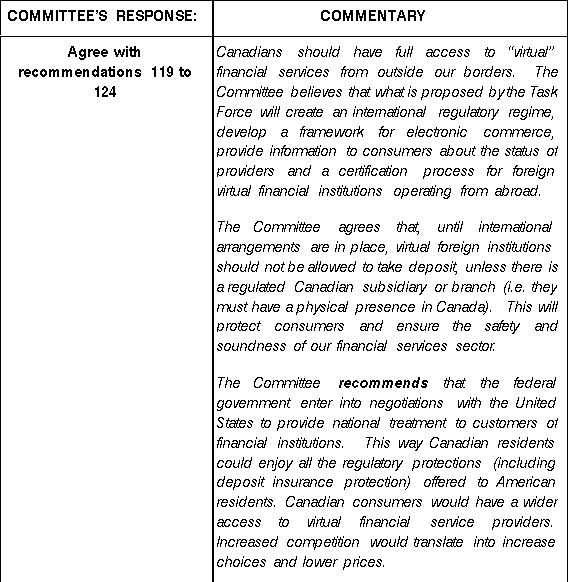FINA Committee Report
If you have any questions or comments regarding the accessibility of this publication, please contact us at accessible@parl.gc.ca.
LIST OF RECOMMENDATIONS
Enhancing Competition and Competitiveness
General
1. Because the financial services marketplace in Canada, as in the rest of the world, is in a state of rapid change, governments and institutions should respond promptly to this report. In the case of the federal government, the implementation of these recommendations should not await the regular review of federal financial institutions legislation scheduled for 2002.
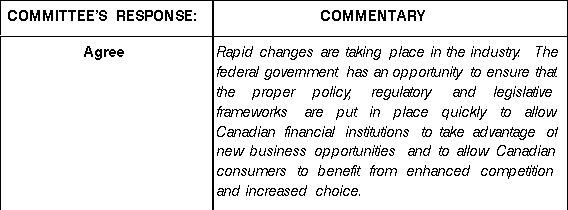
2. Sound corporate governance practices in individual institutions lie at the heart of
ensuring a Canadian financial services sector that is both competitive and prudentially
safe and sound. In light of this:
- (a) The Task Force urges OSFI and other Canadian regulators to emphasize the
constant improvement of corporate governance in their regulatory work.
- (b) The Task Force encourages further active public discussion of ways to improve
the governance of publicly traded Canadian financial institutions, including the
requirement that there be a non-executive board Chair with adequate resources
and time to fulfil the important responsibilities of such a position.

3. Canadian public policy should continue to support the Canadian control of large regulated financial institutions carrying on business in Canada. Specifically:
- (a) There should be a redefined widely-held rule applicable to all large federally
regulated financial institutions, designed to foster continuing Canadian control of
a significant part of the financial services sector.
- (b) The other existing legislative requirements designed to achieve Canadian control
should be maintained.
- (c) The legislation should be strengthened by a provision to make it clear that the
principal executive functions of widely held, federally regulated financial
institutions are required to be carried out in Canada.

Enhancing Competition: Facilitating New Entrants to the Market
4. The criteria and processes for the incorporation and regulation of financial institutions should be revised to facilitate the establishment and growth of new financial institutions. Specifically:
- (a) The Minister of Finance should have discretion to allow a new financial institution,
including a bank, to incorporate with less than the $10 million in capital currently
required, subject to approval by OSFI of the institution's business plan.
- (b) OSFI should streamline its processes to ensure that applications for approval of
the establishment of new financial institutions are processed as efficiently as
possible and within a period of time not to exceed 120 days as the norm.
- (c) Ongoing regulatory requirements should be revised from a "one size fits all"
policy. The administrative burden of regulation for smaller or niche institutions
should be commensurate with their size and the nature of their business
activities, and not determined by requirements designed for large multi-product
financial conglomerates.
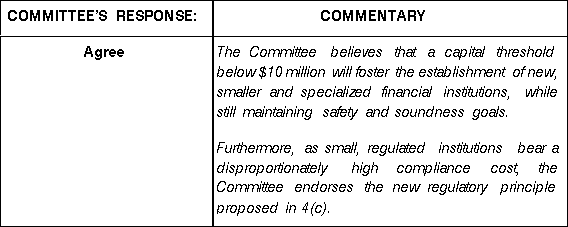
5. There should be a 10-year holiday for new financial institutions from federal capital tax (including both large corporation and Part VI tax). The Task Force urges provincial governments to introduce similar holidays to encourage new entrants in their jurisdictions, free from the debilitating impact of capital taxes on start-ups.

6. Ownership rules should be revised as described under the heading "Ownership
Rules and Enhanced Competition" to permit the establishment of new closely held banks
and cooperative banks.

7. There should be a clearer regulatory framework within which providers of
financial services from outside Canada can do business with Canadians. See
recommendation 119.

8. Withholding taxes should be removed for interest on all arm's-length borrowings,
regardless of their term, to encourage non-resident lenders to compete in extending credit
to borrowers in Canada.

9. Canadian public policy should encourage foreign financial institutions to carry on
business in Canada in order to broaden the choice of providers of financial services to
Canadians. To that end:
- (a) Foreign banks should be able to carry on any banking business in Canada, other
than the taking of retail deposits (i.e., deposits below $150,000), through
branches of the foreign banks as well as through subsidiary corporations, as is
now the case.
- (b) The Task Force endorses the conditions for branch entry outlined in the
Department of Finance consultation paper published in September 1997, except
that:
- (i) the proposed condition that the foreign bank must have $25 billion in assets
world-wide should be revised to permit smaller, well-capitalized foreign
banks to compete in the Canadian marketplace through branch operations;
and
- (ii) the requirement that the foreign bank should have international experience
should be restated to encourage entry from competent banks that may not
have international experience, but may still be able to contribute to
enhancing competition in Canadian markets.
- (c) Foreign banks that wish to take retail deposits in Canada should continue to do
so through subsidiaries and branches of those subsidiaries, to ensure adequate
depositor protection.
- (d) The regulatory regime applicable to foreign bank subsidiaries and branches
should be as light as possible. Prudential regulation should be substantially
reduced where the foreign bank does not take retail deposits.
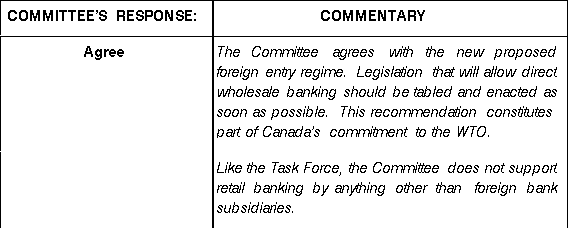
10. OSFI's statutory mandate should be revised to make it clear that OSFI should balance competition and innovation considerations with its present responsibilities in respect of safety and soundness. See recommendation 112.

11. To facilitate the early adoption in Canada of electronic commerce in financial
services and the added competition it will bring, governments at all levels should make it a
priority to ensure that all legislation is compatible with an electronic commerce market
environment.

Enhancing Competition: Equity in Consumer Insurance Plans
12. In order to promote more effective competition between banks and life insurance companies, there should be the same level of support from the federal government for the insurance plans protecting customers of deposit-taking institutions and customers of life insurance companies. See recommendation 117.

Enhancing Competition: Expanded Business Powers
Payments Systems Issues
13. The Canadian Payments Association Act should be amended to permit financial institutions other than deposit-takers to become members of the Canadian payments system upon designation by the Minister of Finance as meeting criteria related to their solvency, liquidity, and regulatory and legal frameworks. The Department of Finance, working with the Canadian Payments Association, should give high priority to determining the classes of institutions which should be eligible. The Task Force expects life insurance companies, securities dealers and money market mutual funds to qualify with few, if any, restrictions.14. The Minister of Finance, rather than the Governor-in-Council, should have the power to approve new by-laws of the Canadian Payments Association or changes in existing by-laws. In addition, the Minister of Finance should have the power to review all new or revised rules of the Association, and to revoke any new rule or revision to existing rules which the Minister determines to be contrary to the public interest.
15. The Minister of Finance should also have the power to issue a directive to the Canadian Payments Association to require a change in a by-law, rule or operating practice which the Minister determines to be in the public interest.
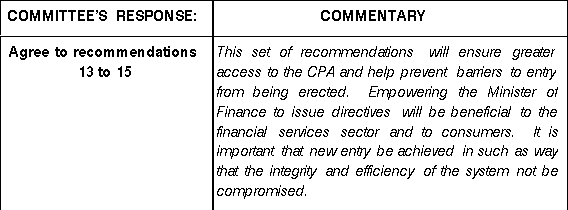
Access to Other Networks
16. The Minister of Finance should monitor the operations of all networks in Canada to ensure that they are operated in a manner designed to enhance competition in financial services and competitive equity among financial services providers. If significant anti-competitive practices are found, legislation should be considered to ensure network access to all competitors on reasonable terms and conditions, and with fair compensation to network sponsors.

17. The members of Interac should take the necessary steps so that the Interac
network is fully functional to permit the network to be used for as many functions as the
technology permits, including the making of deposits through any ATM to any
participating deposit-taking institution.
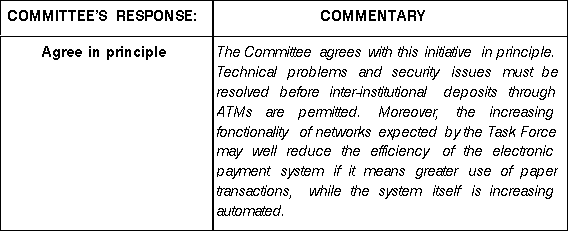
Retailing Insurance by Deposit-Taking Institutions
18. Subject to the adoption of appropriate privacy and tied selling regimes, federally regulated deposit-taking institutions should be permitted to retail insurance through their branches and to use their customer information files to assist in retailing insurance.
- (a) Deposit-taking institutions with less than $5 billion in shareholders' equity should
be permitted to retail insurance through their branches and to use their customer
information files to assist in retailing insurance, as soon as legislation in respect of
privacy and tied selling is in place.
- (b) All other companies should have access to the new powers on January 1, 2002.
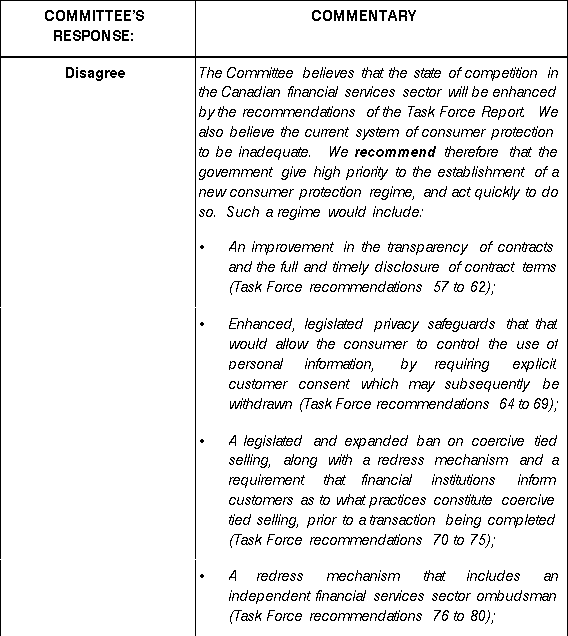
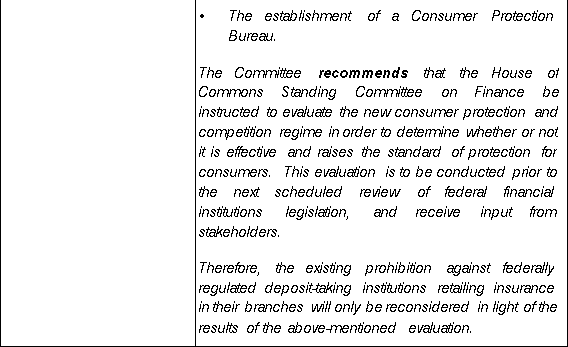
19. Employees of deposit-taking institutions who are engaged in the sale of insurance should comply with applicable provincial requirements with respect to the education and licensing of insurance salespersons, so long as such requirements are non-discriminatory.

20. The insurance and deposit-taking sectors should work with the provinces to
develop a model code for licensing and consumer protection issues arising from the sale
of insurance at branches of deposit-taking institutions.

Light Vehicle Leasing
21. Subject to the adoption of appropriate privacy and tied selling regimes, federally regulated deposit-taking institutions and life insurance companies should be permitted to lease light vehicles, including automobiles, to consumers.
- (a) Deposit-taking institutions and life insurance companies with less than $5 billion
in shareholders' equity should be permitted to lease light vehicles as soon as
legislation in respect of privacy and tied selling is in place.
- (b) All other companies should have access to the new power on January 1, 2002.
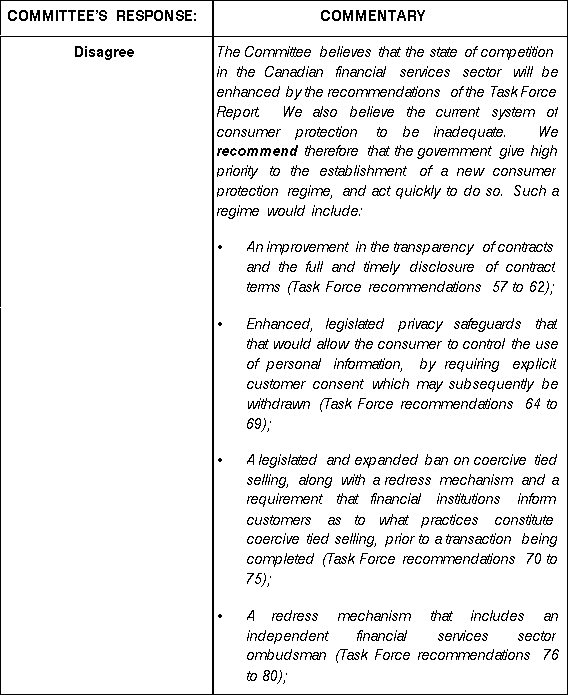
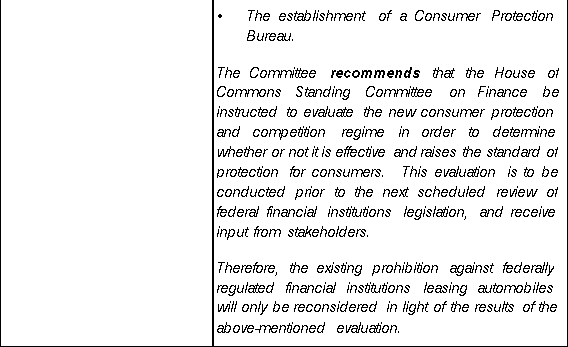
Enhancing Competition: The Co-operative Sector
22. Federal legislation should permit co-operative banks and other financial institutions to be chartered as new institutions, with ownership and governance to be based on co-operative principles. Subject to compliance with applicable provincial legislation, provincial credit unions and credit union centrals should be able to continue as co-operative banks under the Bank Act.23. Federal and provincial governments should take such steps as may be available, within their respective jurisdictions and subject only to prudential constraints, to remove legislative and other regulatory barriers to the success and growth of the co-operative financial services sector, including in particular credit unions and caisses populaires.
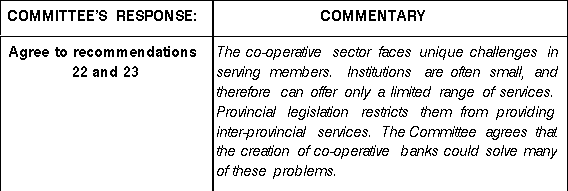
24. Restrictive provisions contained in the Co-operative Credit Associations Act
upon the business activities of credit union centrals should be removed except to the
extent that they are necessary for prudential reasons. Specifically:
- (a) A credit union central should have the ability to provide wholesale financial
services to another financial institution without the present requirement that the
other institution first make an investment in a subsidiary service corporation of the
credit union central.
- (b) Credit union centrals should have the ability to provide retail financial services
directly to members of local credit unions.
- (c) Where credit union centrals act in concert in relation to an investment, they
should be treated as one entity for purposes of the Minority Investment
Regulations.
- (d) The credit union movement, OSFI and the Department of Finance should
establish a Working Group to resolve any prudential issues.

Enhancing Competition: More Flexible Corporate Structures
25. There should be no restrictions on corporate structures available to financial institutions unless required by safety and soundness considerations.26. Federally regulated financial institutions should have the option of being organized as subsidiaries of regulated financial holding companies incorporated under a new Financial Holding Companies Act. Specific principles to be applicable in the holding company regime would include the following:
- (a) The regulatory requirements applied to the holding company and its unregulated
subsidiaries should be as non-intrusive as possible.
- (b) The ownership requirements, and the other prescribed indicia of Canadian
control which are applicable to regulated financial institutions, would also be
applicable to financial holding companies.
- (c) The holding company would be required to have a controlling interest in its
principal Canadian operating regulated financial institutions.
- (d) The holding company should be capitalized in such a way as to avoid double
gearing and so that the holding company can serve as a source of strength for the
group.
- (e) The holding company would be a non-operating company and its permitted
investments and downstream subsidiaries should mirror those of operating
regulated financial institutions conducting business under the financial institution
parent model.
- (f) Related-party rules would apply to transactions between the holding company
and its subsidiaries.
- (g) OSFI should have full access to information from all companies in the corporate
group.
- (h) There should be disclosure rules to ensure that persons dealing with unregulated
entities in the corporate group are clearly informed that the entities are not
regulated, that their securities are not deposits and are not insured or guaranteed
by CDIC or any other government-sponsored insurance program, and that
related regulated financial institutions do not provide guarantee support.
Unregulated entities within the group should not be able to use the name "bank".
- (i) A reorganization of a regulated financial institution as a subsidiary of a holding
company under the Financial Holding Companies Act would require the approval
of OSFI.

27. Existing unregulated holding companies should be grandfathered so that they would not be required to comply with the provisions of the Financial Holding Companies Act, subject to OSFI's continuing to be satisfied with the quality and substance of undertakings in respect of prudential issues. The grandfathered status would be lost if the grandfathered company controlled both a bank in Canada and a foreign bank.
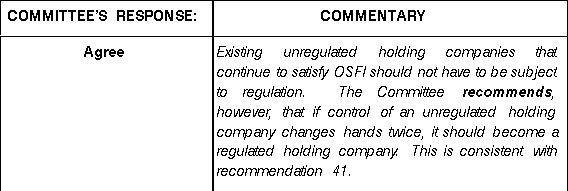
28. The Department of Finance and OSFI should review the present downstream
restrictions on subsidiaries and minority investments with the objective of determining:
- (a) whether activities that are currently required to be conducted in the parent
financial institution could be permitted to be conducted either in a permitted
subsidiary or in minority investment form; and
- (b) whether functions which are now required to be carried on in a subsidiary could
be permitted to be carried on by way of minority investment.

Enhancing Competition and Competitiveness: Ownership Rules
29. The ownership rules should be designed to foster:
- (a) entrepreneurship and competition;
- (b) the safety and soundness of the system; and
- (c) the preservation of Canadian control of substantial parts of the financial services
sector.

30. In respect of large financial institutions, the maintenance of Canadian control and the better assurance of safety and soundness by the separation of commercial and financial interests are key principles underlying the ownership rules. For those reasons, large financial institutions should be widely held, as defined in recommendation 33. It is important to foster entrepreneurship and competition in the start-up and growth of new financial institutions; accordingly, smaller financial institutions should not be required to be widely held.

31. Any holding of more than 10 % of any class of shares in a federally regulated
financial institution by a person or group of persons acting jointly or in concert should
continue to require the prior approval of the Minister of Finance, on a "fit and proper
person" test.

32. There should be a single ownership regime, consistent across the financial
services sector, which is based on the size of the institution measured by its shareholders'
equity. The essential parameters of the ownership regime would be as follows:
- (a) In order to foster start-ups and competition, institutions with less than $1 billion in
shareholders' equity would be able to be closely held, including sole ownership
by one person or company.
- (b) In order to provide enhanced corporate governance in the interest of safety and
soundness for growing institutions, financial institutions with more than $1 billion
but less than $5 billion in shareholders' equity would be required to have at least
35 % of their voting participating shares widely held and publicly traded.
- (c) The Minister of Finance would have the authority to exempt a subsidiary of a
foreign financial institution from the requirement to have a 35 % public float.
- (d) The largest financial institutions, those with shareholders' equity in excess of
$5 billion, would be required to be widely held as described in
recommendation 33.
- (e) A widely held, regulated financial institution that is incorporated in Canada
should be able to hold up to 100 % of the shares of another regulated financial
institution, regardless of size.
- (f) Where a single owner or group of related owners has effective control of more
than one regulated financial institution, the applicable ownership rule will be
determined on the basis of the combined shareholders' equity of the controlled
financial institutions.
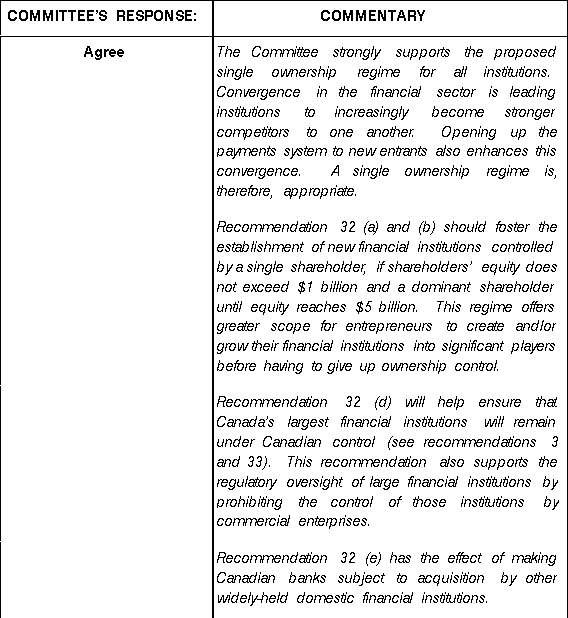
33. Large financial institutions, i.e., those with shareholders' equity in excess of $5 billion, would be subject to the following widely-held requirements:
- (a) As described in recommendation 31, no person, or group of persons acting
jointly or in concert, would be allowed to own or control more than 10 % of any
class of shares without the approval of the Minister of Finance.
- (b) The Minister of Finance should have discretion to permit ownership positions in
any class of shares in excess of 10 % and up to 20 %. Shareholders permitted by
Ministerial order to own more than 10 % should not collectively own or control
more than 45 % of any class of shares.
- (c) The Minister of Finance should also have the discretion to permit a shareholding,
on a temporary basis, in excess of the 20 % limit, subject to the Minister's
approving a plan from the shareholder to divest to an agreed percentage (not to
exceed 20 %) within a fixed time period. The Minister should be empowered to
obtain and enforce undertakings from any person holding such an excess
shareholding, both to confirm the agreement in respect of the divestiture of the
shares and to assure that voting rights will not be exercised on the shares in
excess of 20 % during the period prior to disposition.
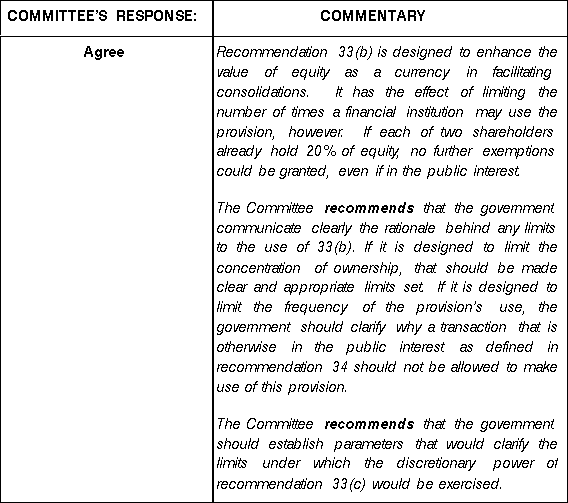
34. Although the discretion of the Minister of Finance to permit a shareholding in excess of 10 % for institutions that must be widely held should not be constrained by statute:
- (a) The discretion should be exercised when the Minister concludes that the excess
shareholdings would:
- (i) enhance competition or competitiveness in the financial services sector;
- (ii) enhance the safety and soundness of the Canadian financial services
system; or
- (iii) foster the growth of the Canadian financial services industry by, for example,
facilitating a business alliance or an acquisition by a Canadian financial
institution.
- (b) The increased shareholding limit should not be generally available for passive
investments in which the excess shareholding would add no value to the
business beyond the investment of the shareholder.
- (c) The Minister should issue guidelines to identify the circumstances in which the
Minister would be prepared to consider an application to exercise the discretion.

35. An institution which reaches the $1 billion and $5 billion thresholds, and which therefore becomes subject to new ownership criteria, should have a reasonable period of time, to be determined with the approval of the Minister, to comply with the applicable requirements of the ownership regime.

36. Businesses organized in the cooperative or mutual form of ownership should be
deemed to comply with the widely-held rules by definition and without the need for special
exemption, whatever their size.

37. In respect of financial institution holding companies, the ownership rules should
apply to the holding company on the basis of the combined shareholders' equity of the
regulated financial institutions controlled by the holding company.

38. In respect of demutualized life insurance companies, they should become
subject to the general, size-based ownership regime after a transition period of three years
from the date of demutualization. Demutualized companies with shareholders' equity in
excess of $5 billion would have to be widely held and remain so from the date of
demutualization. Transition guidelines for the three-year period should assure that all
demutualized companies, as a matter of principle, are not subjected to hostile takeover
bids or amalgamation proposals. The guidelines should therefore provide that the smaller
demutualizing companies should also be widely held for the three-year transition period.
The transition guidelines should also provide that, in the normal course, the Minister of
Finance should not approve any proposal for merger or acquisition of any newly
demutualized company. However, should any demutualized company and its board of
directors propose a transaction that, in the opinion of the Minister, is clearly in the public
interest and desirable to conclude within the three-year transition period, it should be
allowed to proceed.

39. The Government should have the power, to be used only in exceptional cases, to
approve the acquisition of a large widely held Canadian financial institution by a foreign
purchaser, free from the impact of the widely-held rules. Any such transaction should be
subject to:
- (a) the completion of the usual processes for merger approval (i.e., review by the
Competition Bureau and OSFI, and Ministerial approval following the completion
of the Public Interest Review Process); and
- (b) the following additional criteria being met:
- (i) the buyer should be a widely held, regulated financial institution approved by
OSFI;
- (ii) the acquisition should be approved by the Governor-in-Council on the
recommendation of the Minister of Finance that the acquisition would be in
the Canadian public interest by enhancing competition or competitiveness
in the financial services sector or by enhancing the safety and soundness of
the Canadian financial services system; and
- (iii) enforceable undertakings should be provided by the buyer to the Minister to
ensure that the transaction provides its intended benefits to Canada.

40. A Schedule I bank which is subject to the present 10 % rule but which would not, by reason of its size, be subject to the new size-based, widely-held regime would initially be subject to the new widely-held rule but would have the right to be recategorized into the class of financial institution, with the resulting ownership rules, which would apply by reason of its shareholders' equity. This recategorization would require the approval of the board of directors of the bank, confirmed by a special resolution of the shareholders and the approval of the Minister of Finance.

41. A company with share ownership not conforming to the new ownership rules at
the time of their introduction should be permitted to continue business without altering its
ownership structure, subject to the Minister being satisfied with the quality and substance
of the undertakings provided by any controlling shareholder in respect of prudential
issues. Such a company should not be permitted by reason of its grandfathered status to
acquire an institution that, by virtue of its size, must be widely held. There would be no
requirement for the dilution of the share ownership of the control block, whatever the
shareholders' equity of the financial institution might be at any time. A regime should be
adopted so that, over time, the nonconforming institution would come into compliance
with the ownership regime. Particulars of options which the Task Force suggests should be
available to the controlling shareholder are set out in Background Paper #2.

Enhancing Competitiveness: Accounting Principles
42. Canadian accounting principles relating to the creation and amortization of goodwill in business combinations should be revised to eliminate their present negative impacts on financial sector restructuring in Canada and on the ability of Canadian financial institutions to successfully compete for acquisitions outside Canada. To that end:
- (a) The Task Force urges the Canadian Institute of Chartered Accountants, working
with OSFI and the financial institutions, to develop a mutually acceptable interim
solution, to be applicable until such time as Canadian and U.S. accounting
principles in respect of business combinations are harmonized.
- (b) If the Canadian Institute of Chartered Accountants is not able to determine a
solution, OSFI should use its power to specify principles for business
combinations and goodwill accounting so as to (i) facilitate consolidations of
small and mid-sized Canadian financial services companies into stronger
competitors in the Canadian marketplace, and (ii) permit Canadian companies to
participate on a competitive basis in pursuing acquisition opportunities.
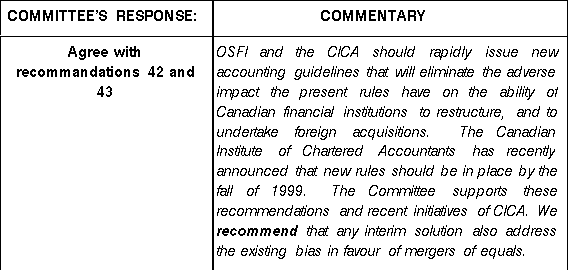
Enhancing Competitiveness: Taxation
44. Governments in Canada should recognize the importance of financial institutions to the Canadian economy, both as strong domestic industries with significant international potential and as vital contributors to the health of other Canadian enterprises. Because the level of taxation of Canadian financial institutions is damaging to the competitive position of Canadian companies and is increasing costs to Canadian users of financial services:
- (a) As fiscal conditions permit, governments should take steps to reduce the level of
taxation so that the financial services industry is equitably treated vis-à-vis other
sectors in the Canadian economy, and competitively taxed vis-à-vis financial
institutions in other countries.
- (b) In particular, steps should be taken both at the federal and provincial level as soon
as possible to address the burden which special capital taxes place on financial
institutions:
- (i) Special capital taxes on financial institutions should be eliminated. If this is
not possible, the recommendations in (ii), (iii) and (iv) should be pursued.
- (ii) To the greatest extent possible, the tax burden should be shifted from capital
and toward profits.
- (iii) The federal government should work with the provinces to define a common
tax base related to capital.
- (iv) Efforts should be made to define a capital tax base that would tax capital in
excess of that required for regulatory purposes very lightly or not at all, so as
to encourage Canadian financial institutions to be well capitalized.
- (c) The Task Force urges provincial governments to be sensitive to the double
taxation consequences of transaction taxes on insurance premiums (such as the
GST, sales taxes and premium taxes) and their impacts on consumers and, over
time, to take measures to alleviate those impacts.
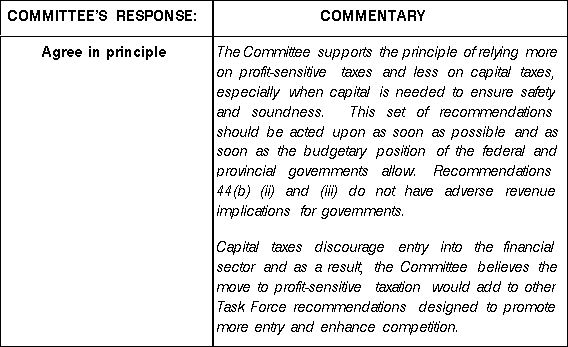
Preserving Competition: Consolidation and Mergers
45. There should be no general policy which prevents large institutions from entering into business combinations with other large institutions, whether by amalgamation, acquisition or in other ways. The "big shall not buy big" policy should not apply to any federally regulated financial institution, including the Schedule I banks.
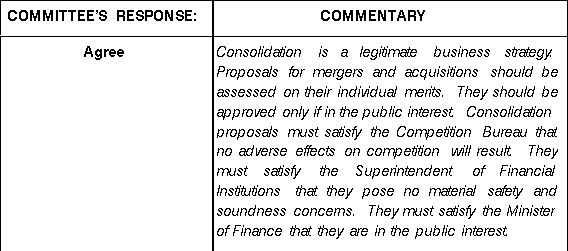
46. Business combinations involving a federally regulated financial institution should
be assessed by (a) the Competition Bureau under the Competition Act in respect of
competition concerns, (b) the Office of the Superintendent of Financial Institutions in
respect of prudential issues, and (c) the Minister of Finance in respect of general public
interest considerations. Relevant information should be shared on a confidential basis
among these parties as part of the review process.
47. In respect of the review by the Competition Bureau:
- (a) The Task Force endorses the general approach proposed by the Director of
Investigations and Research in his submission to the Task Force in November
1997, as amended by the Merger Enforcement Guidelines for Financial
Institutions issued on July 15, 1998.
- (b) The Task Force agrees, in particular, that the Director should not assess mergers
on a "first in, first out basis," but rather should consider all merger proposals
separately and in combination, as the Bureau makes its determination.
- (c) The Director should pay particular attention to the competition concerns of small
and medium-sized business, users of personal financial services who may still be
branch-dependent, and regional markets where there are few alternative
suppliers.
- (d) The Director should consider the new competitive choices which already exist in
respect of certain product lines and which are also likely to emerge as a result of
the emergence of new channels of distribution and liberalization of public policy
constraints.
- (e) Where necessary, the Director should actively pursue remedial options.
- (f) In reviewing merger proposals and in carrying out other responsibilities under the
Competition Act, the Director should consider the extent to which the terms and
conditions of access to networks, and their functionality, inhibit effective
competition.
- (a) The Superintendent's attention should be directed at identifying a new prudential
risks that may arise by reason of the transaction.
- (b) OSFI should be prepared to provide assistance, including the secondment of
personnel, to the Competition Bureau to ensure that it has sufficient expertise,
with industry experience and awareness, to assess and protect the public interest
from the competition perspective.
- (a) The approval of the Minister should be required for all business combinations
involving one or more federally regulated financial institutions, except for a
transaction between two federally regulated institutions which does not require
pre-notification under the Competition Act. This should be subject to approval by
the Superintendent.
- (b) If two or more institutions, at least one of which is federally regulated, propose to
combine to form an enterprise with shareholders' equity of more than $5 billion
and where each of the combining institutions has at least $1 billion of
shareholders' equity, the Minister should require a formal Public Interest Review
Process prior to determining whether to grant approval. The Minister should have
the right to invoke the Public Interest Review Process in the case of other
transactions.
- (c) The Minister should issue Public Interest Review Process guidelines to describe
the mechanics of the process. The guidelines should require merger proponents
to submit a detailed Public Interest Impact Assessment (i) describing their
business plan and objectives; (ii) clearly identifying the benefits and costs to the
nation and the public of the proposed transaction, including the considerations
described in (d) below and such other considerations as the Minister may
specify; and (iii) outlining any remedial or mitigating steps in respect of public
interest costs, and any assurances in respect of public interest benefits, which
are proposed by the merger proponents.
- The Public Interest Impact Assessment should be available for public comment
for a reasonable time period to be specified by the Minister. The decision of the
Minister on the proposed transaction should be made as promptly as possible
following the public comment period.
- (d) In assessing whether approval should be given, the Minister should review the
recommendations of the Director and the Superintendent, and the views
obtained in the Public Interest Review Process, in light of all relevant public
interest considerations, including:
- (i) the costs and benefits to individual customers and small and medium-sized
business;
- (ii) regional impacts;
- (iii) international competitiveness;
- (iv) employment;
- (v) the adoption of innovative technologies; and
- (vi) the extent to which approval may create a precedent.
51. Mergers of large financial institutions should be permitted as long as, after implementing any necessary remedial or mitigating steps, the Minister is of the opinion that markets will remain competitive, that there are no material safety and soundness concerns, and that the transaction is in the public interest.
52. The Minister should have legislative authority to seek and obtain enforceable undertakings from merger proponents to ensure that commitments made to address competition and other public interest concerns are fulfilled:
- (a) The Department of Finance should monitor compliance with such undertakings
and report regularly to the Minister, who in turn should report to Parliament.
- (b) The Governor-in-Council, on the recommendation of the Minister of Finance,
should have the authority to issue directions in respect of undertakings, including
a direction to cease from committing an act, or to perform such act, as in the
opinion of the Minister is necessary to remedy a situation where an undertaking is
not being met.
- (c) Strong sanctions should be provided for non-compliance with undertakings
given by merger proponents and directions of the Governor-in-Council.
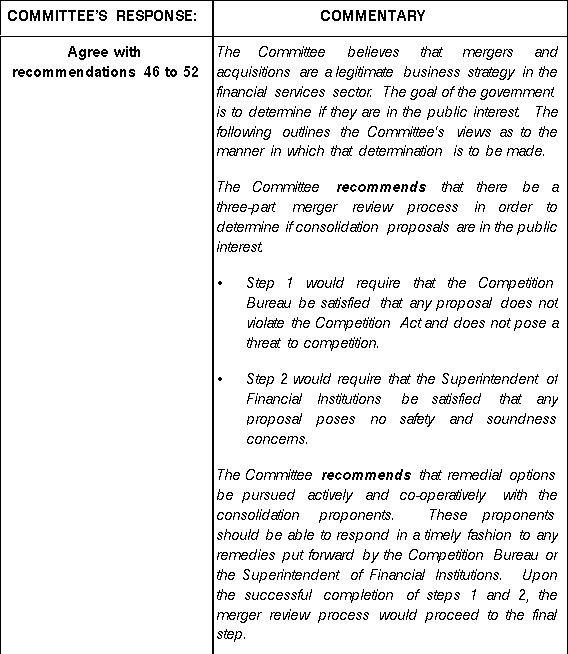
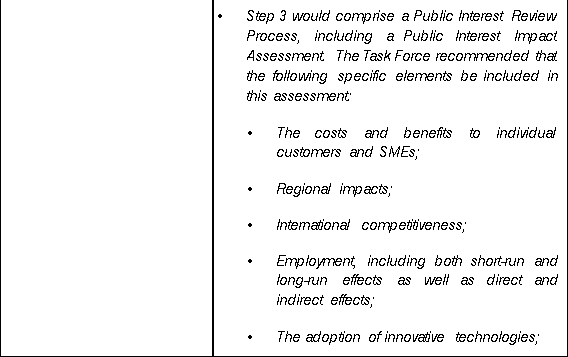
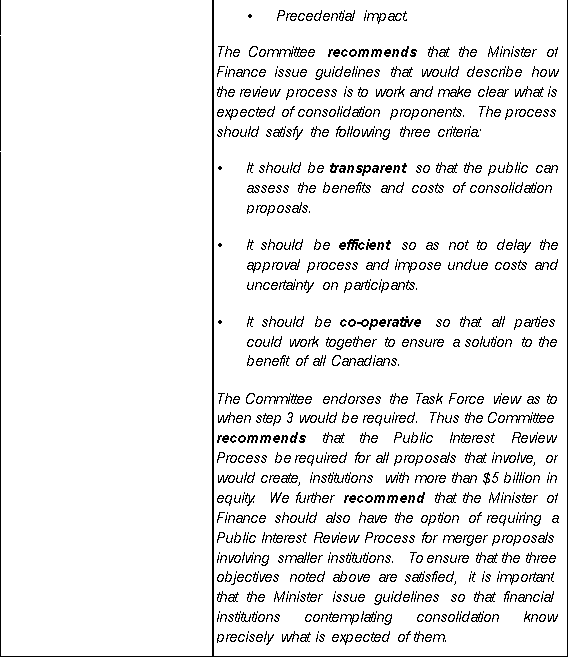

Empowering Consumers
General
53. An efficient, competitive marketplace requires that the market conduct practices of suppliers of financial services should be such as to ensure full, plain and adequate disclosure to consumers; fair, reasonable and non-abusive transaction practices; and adequate redress mechanisms to resolve disputes. Governments and financial institutions should work together to achieve those goals.54. The federal government should ensure that market conduct regulation, within areas of its constitutional jurisdiction, embodies best practices, bearing in mind the criteria described in recommendation 53.
55. To ensure consistent market conduct treatment across Canada and across the spectrum of financial services providers, the federal government and the provinces should intensify harmonization and co-ordination efforts in respect of the standards of market conduct.
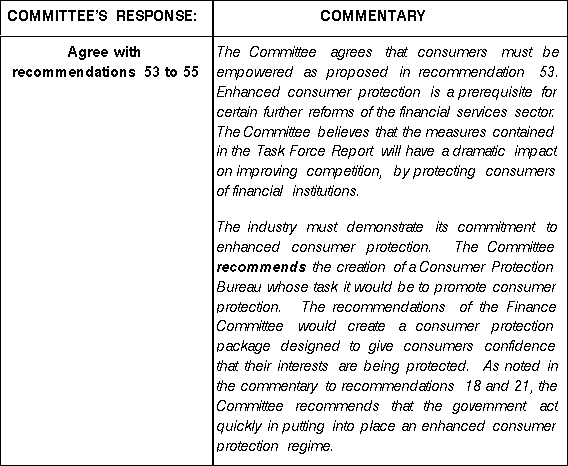
56. An efficient and competitive financial services marketplace requires continuing
consumer vigilance and advocacy. To that end:
- (a) The Task Force urges consumer advocacy groups to work together to pursue the
concept of the establishment of a Financial Consumers Organization to ensure
that there is effective consumer advocacy in the sector. Once a broad consensus
of the groups is reached, governments and financial institutions should work with
the sponsors to facilitate the organization's success.
- (b) OSFI, the Department of Finance and Industry Canada should ensure that
adequate resources are available to support project research on consumer
issues and to fund relevant consumer advocacy groups to participate fully in
important public policy initiatives relating to consumer protection, including
those recommended in this report.
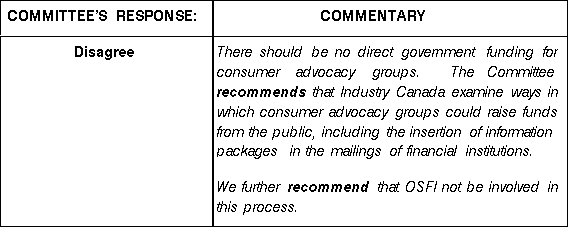
Disclosure and Transparency
57. Because the level of transparency in many financial services consumer contracts and marketing documents in Canada falls short of what Canadian consumers have a right to expect and industry is capable of delivering, financial institutions and their industry associations should intensify efforts to improve transparency and disclosure, using the following "best practices" guidelines:
- (a) Timing: All essential information should be provided to the customer before a
transaction is entered into, including the terms of the agreement between the
provider and the customer.
- (b) Presentation clarity: Documents should be presented in a manner which is
capable of ready comprehension by a reasonably intelligent consumer in the
marketplace.
- (c) Organisational clarity: Documents should be formatted to highlight information
that is important to the customer.
- (d) Brevity: Documents should be as brief as possible, given the need for reasonable
completeness from a commercial and legal perspective.
59. Leaders of financial institutions should make increased disclosure and transparency high, visible corporate priorities, and should ensure that adequate resources are available to ensure best practices, including participation in the multipartite process described in recommendation 58. Institutions should set milestones and benchmarks against which to assess their progress, should monitor it by periodic user testing programs, and should report progress in their annual Community Accountability Statements described in recommendation 99.
60. Whenever governments review financial institutions or market conduct legislation on an ongoing basis, they should take all appropriate steps to improve disclosure and transparency. To that end, they should remove or reduce regulatory requirements that prevent the use of clear language, and should give positive reinforcement in law to the results reached by the multipartite Working Group.
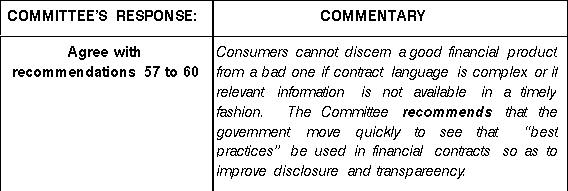
61. Market conduct regulators, at both the federal and provincial levels, should audit
financial institutions on a regular basis for best practices in respect of transparency and
disclosure in transaction documents, in light of the benchmarking conclusions arising
from the activities of the Working Group. OSFI should have this responsibility at the federal
level.
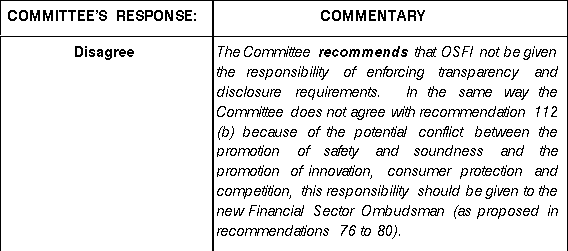
62. To provide more adequate disclosure, fees and commissions paid to employees
or third parties in respect of any financial services transaction should be required to be
clearly disclosed before the transaction is entered into.
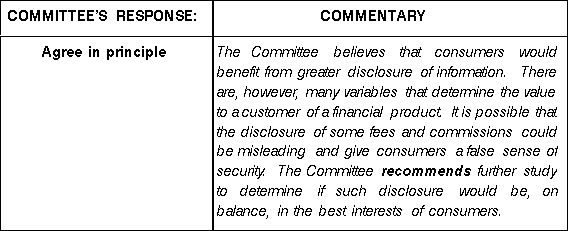
63. There should be a statutory prohibition on contract terms that permit the
unilateral amendment of financial services consumer contracts by financial institutions.

Privacy
64. The Task Force supports the announced intention of the Government to legislate a comprehensive privacy regime applicable to all commercial enterprises. With respect to financial institutions, we recommend that the legislation be based on the premise that privacy of personal information is a fundamental right. The legislation should prescribe Basic Minimum Privacy Standards.

65. The Basic Minimum Privacy Standards should include the following
requirements:
- (a) The customer should be able to specify the relationship the customer seeks with
the financial institution and information collected should be specific to that
relationship.
- (b) The financial institution should specify what information may be sought from third
parties. in accordance with the relationship sought by the customer.
- (c) Customer consent to the collection, use or disclosure of information should be
express and not implied, and the customer should be able to revoke or alter
consent at a subsequent time.
- (d) Target marketing should be subject to the customer's express agreement in
writing.
- (e) The customer should have access to the customer's personal information files
and the right to require the correction of erroneous data.
67. Medical information should receive special protection in the privacy regime. In particular:
- (a) The same employee of a financial institution should not be engaged in both
insurance sales and credit granting functions.
- (b) There should be strict segregation within institutions of information collected for
insurance and credit purposes.
- (c) An insurance company should not be allowed to share medical information with a
deposit-taking institution, whether or not it is affiliated, even with customer
consent.
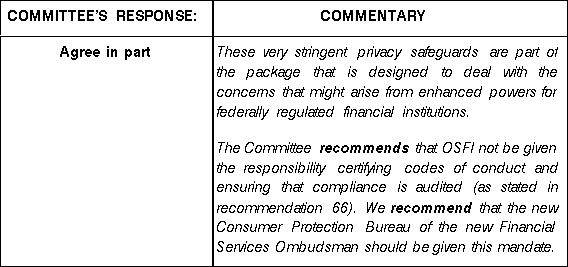
68. Consumers should have redress in respect of privacy matters to the financial services sector Ombudsman and, in addition, should have appropriate civil remedies, including punitive damages.

69. The federal government should work with provincial governments with the
objective of ensuring that there is harmonized privacy legislation applicable to all
regulated and unregulated providers of financial services in their dealings with individuals
and small businesses. Provincial governments, where they have not already done so,
should legislate a privacy regime which incorporates the Basic Minimum Privacy
Standards.

Coercive Tied Selling
70. Because of the inequality of information and bargaining power between financial institutions and their customers, financial services legislation in all jurisdictions should unequivocally enshrine the freedom of financial services customers from coercion in their dealings with financial institutions.71. There should be a specific legislative ban on coercive tied selling by banks and other financial institutions. With that aim, section 459.1 of the Bank Act should be proclaimed with amendments to broaden its scope to include all credit products, insurance and such other products or services as might be prescribed by regulation. Similar legislation should be applicable to all federally regulated financial institutions. As contemplated in section 459. 1, regulations should be passed to further elaborate on the statutory terms 11 "undue pressure" and "coercion."
72. Prior to entering into any financial services contract for the sale of insurance or the granting of credit, suppliers and intermediaries should be required to provide the customer with a clearly written description of what constitutes coercive tied selling and advice that coercive tied selling is not legal. The Government should work with industry and consumer groups to develop a common, easily understood notification statement.
73. The legislation should provide appropriate remedies for breach of the prohibitions against coercive tied selling, which would include prosecution, and private recourse through the ombudsman and court systems. Civil remedies should include punitive damages.
74. Suppliers and intermediaries should be required to ensure that every salesperson is trained to avoid coercive sales practices, including coercive tied selling. Initiatives such as the Canadian Bankers Association Code should be pursued.
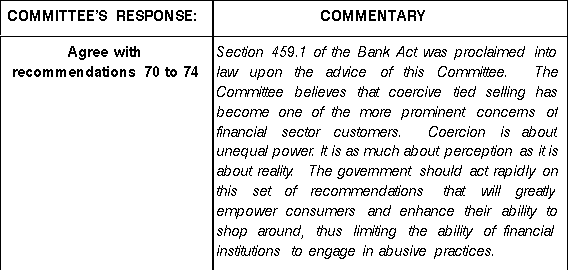
75. Financial institutions should endeavour to itemize and price separately the
different components of a package of services offered to customers which, under
reasonable business practices, might be priced and sold separately.

Redress
76. Consumers of financial products and services should have improved means of private redress in the case of a dispute with a financial services provider, including a dispute arising from unfair or illegal market conduct practices.77. Federal legislation should establish an Ombudsman office to which all federally regulated financial institutions and their subsidiaries would be required to belong.
78. The Ombudsman system should also be made available, on a voluntary basis, to provincially chartered and unregulated financial institutions. Provinces should require provincially regulated institutions to opt in to the Ombudsman system so that there would be a common redress system available to all Canadians, regardless of the financial institution with which they do business.
79. Each member financial institution should be required to make available an internal ombudsman who would be the first recourse for consumers.
80. The Ombudsman office should be structured in a way which will engender public confidence in its independence, mandate, accessibility and reliability, and which will be readily visible in the community. To that end:
- (a) In respect of independence: The Ombudsman office should report to Parliament
through the Minister of Finance. It should be under the management and
direction of a board of directors, with representation from financial institutions,
but with a majority of independent directors, all of whom would be appointed by
the Minister of Finance. The board would appoint the Ombudsman, would
approve funding arrangements, would recommend terms of reference of the
Ombudsman for approval of the Minister, and would determine issues of policy.
- (b) In respect of mandate: The mandate of the Ombudsman office should include all
issues of fairness and maladministration by a financial institution, determined by
reference to its legal obligations, good practice and the institution's established
policies and practices.
- (c) In respect of accessibility: Individual and small business customers should be
able to access the system. Other customers should have access at the discretion
of the Ombudsman. Costs of the Ombudsman office should be borne by the
industry members on an assessment basis determined by the board of directors
and approved by the Minister.
- (d) In respect of reliability: Disputes should be resolved in a cost-effective, informal
environment, entailing mediation where appropriate, and with the Ombudsman
having the power to issue a ruling where mediation fails. To ensure cost-effective
and non-legalistic proceedings, the rulings should not be binding. Any ruling of
the Ombudsman which is not complied with by an institution should be made
public, with the name of the defaulting institution and with appropriate
protections to ensure the privacy of the complainant. Should financial institutions
act in a manner to frustrate or impede the effectiveness of the Ombudsman
process, including any persistent failure to follow the Ombudsman's
recommendations, binding decisions should be considered.
- (e) In respect of visibility: The existence and nature of the Ombudsman office,
together with means of access to it, should be made widely known. Regulated
financial institutions should be required to include information about the
Ombudsman system, in an agreed format, in regular mailings to customers.
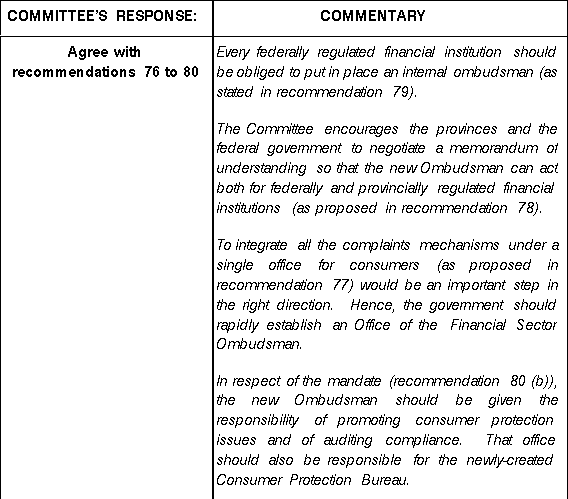
Proficiency Standards
81. Because an effective marketplace requires both that consumers be informed and that salespersons be well equipped to provide sound advice, there should be more effective training of persons who deal with the public in the sale of financial services products, including both intermediaries and employees of financial services institutions.82. Well-defined and adequate proficiency standards should be adopted for market intermediaries, including a post-secondary diploma for new entrants, adequate examination standards and enhanced continuing education requirements.
83. Proficiency standards should be harmonized to the greatest possible extent across jurisdictions.
84. Given marketplace characteristics and consumer interests, the Task Force supports the regulation of financial services market intermediaries under provincial jurisdiction by a single regulator in each province.
85. Licensing restrictions for intermediaries based on occupation should be removed. Provincial governments should remove restrictions mandating full-time employment and should enter into reciprocal licensing agreements relating to residence of intermediaries, with the objective of improving service and lowering costs to the consumer.
86. The Task Force supports provincial review of:
- (a) the current exemptions from provincial licensing requirements to determine
whether those who benefit from the exemptions do in fact have training and
supervision which is equivalent to the standards proposed for licensed market
intermediaries: and
- (b) the status and training of market intermediaries who are not currently covered by
any proficiency regime even though they deal with retail consumers.

Canadians' Expectations and Corporate Conduct
General
87. There should be greater disclosure and transparency in respect of the performance of financial institutions in meeting community expectations. Government, institutions and concerned public interest groups should co-operate in identifying and resolving issues of unmet public expectations as they arise.

Responding to Expectations about Social Performance
Access
88. The Task Force affirms that access by low-income Canadians to basic transaction services of banks and other deposit-taking institutions is a very important policy objective, and it urges the Government, financial institutions and social interest groups to continue to work constructively together to attain it.89. Federally regulated deposit-taking institutions should aggressively pursue the implementation of the agreements reached between the Government and major banks in February and December 1997 concerning the opening of accounts and other access questions. Provincially regulated deposit-taking institutions should implement arrangements that are at least as effective.
90. To ensure access to basic banking services:
- (a) The federal and provincial governments should make low-cost personal
identification available to anyone requiring it, so as to eliminate problems of
access arising from lack of satisfactory identification.
- (b) Financial institutions, governments and social interest groups should work
together to develop a common basket of services included in a standard basic
account to be offered by all deposit-taking institutions. The basic account should
recognize the impact of technology on basic banking services and, accordingly,
should include a debit card as well as the right of the holder of a basic account to a
specified number of withdrawals without additional charge.
- (c) Deposit-taking institutions should make standard basic accounts available at
reasonable charges. There is no need to legislate the price to be charged by
financial institutions as long as the basic accounts are readily available at a
reasonable price. From time to time, the Department of Finance should monitor
the basic account prices charged to ensure that they remain reasonable.
- (d) Deposit-taking institutions should be required to post prominently in each branch
the terms and conditions of their most economic transaction account, together
with the identification requirements needed to open one.
- (e) In order to encourage access to accounts, governments should use direct
deposit for all government programs that provide regular benefits. There should
be provision for master accounts where appropriate. Although such programs
should be optional for those who do not want to receive direct deposits, every
effort should be made to encourage participation.
- (f) To eliminate any reason for financial institutions to place holds on government
cheques when adequate identification is presented, governments should
implement indemnity programs with financial institutions pursuant to which
low-income people, whether or not they are customers of the institutions, can
gain immediate access to their funds. Financial institutions should ensure that
there are no holds when indemnification agreements are in place.
- (g) Financial institutions should continue to work with community groups to develop
and implement effective training programs for staff, reinforced by incentive and
compensation policies at the branch level, to ensure that the objectives of the
February and December 1997 agreements on access are achieved.
92. Although the Task Force would prefer to see access problems resolved by a cooperative effort of governments, financial institutions, and social interest and community groups, it must be recognized that in a modern society access to financial services is of vital importance. Therefore, if significant progress is not made within a reasonably short time to resolve access issues, the Government should legislate the terms of the February and December 1997 agreements, with appropriate sanctions for non-compliance.

Branch Services Access
93. In order to provide customers and affected communities with a reasonable time to adjust and seek alternative services when the branch of a deposit taking institution is to be closed:
- (a) Federally regulated deposit-taking institutions should be required to provide at
least four months' advance notice before closing branches. The notice should be
posted prominently in the branch, communicated to all customers and relevant
local authorities, and published in community newspapers.
- (b) The financial institution should work proactively with the community to explore
alternatives and to ease the transition.
- (c) The Task Force urges provinces to consider a similar requirement for provincially
chartered deposit-taking institutions.

Micro-Credit
94. The Task Force recommends that governments, financial institutions and community groups establish partnerships to promote micro-credit programs that assist individuals to establish and build new businesses and thereby contribute to self-employment.95. Governments should participate in micro-credit by providing basic start-up and infrastructure support to pilot micro-lending programs that can demonstrate soundly based loan plans and that are unable to secure administrative financing from other sources. Governments should not fund loans under micro-credit projects.
96. Governments should review all social assistance programs to ensure that micro-credit loans do not reduce social assistance benefits, thereby creating a disincentive for individuals seeking self-reliance through micro-credit financing.
97. Banks and other financial institutions should be encouraged to develop partnerships with micro-credit programs in local communities. For example, credit-granting institutions could provide administrative support and know-how to micro-credit enterprises to develop systems, such as loan application evaluation procedures, or could fund program overhead costs.

Partnerships with the Voluntary Sector
98. Financial institutions should work with the voluntary sector to develop new, innovative partnerships that would help build stronger, healthier and more caring communities. Leaders in the financial institutions and in the voluntary sector should work together to this end, beginning with innovative pilot projects.

Community Accountability Statements
99. Each federally regulated deposit-taking institution and life insurance company should be required to make available to the public and file with the Minister of Finance one or more annual Community Accountability Statements to describe its contribution to the community and to identify emerging community needs to which it intends to respond. The Minister should table all such statements with the Standing Committee of the House of Commons on Finance. The Community Accountability Statements will serve as the basis for a continuing dialogue between leaders of the financial institutions and the community.
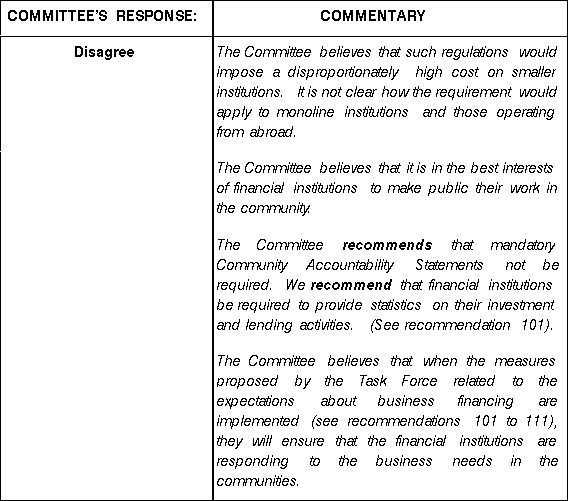
100. Provincial governments should consider implementing similar requirements for
Community Accountability Statements from financial institutions within their jurisdiction.

Responding to Expectations about Business Financing
SME and KBI Finance Issues
101. The Government should undertake a substantial program of information collection and analysis to ensure that there is adequate information relating to the financing needs of small and medium-sized businesses (SMEs) for effective public policy development. To that end:
- (a) Statistics Canada should collect data on the supply of debt and equity financing
to small and medium-size enterprises, including in particular coverage of
knowledge-based industries (KBIs), aboriginal enterprises, and other sectors or
subsectors determined from time to time to be of particular public interest. The
data collection program should cover all regulated and unregulated private- and
public-sector financial institutions engaged in significant loan, lease, equity
investment, or securitization activity in the small business market. Details of the
information collection program, which should be comprehensive, should be
determined by Statistics Canada in consultation with data providers, potential
users in the community, and representatives of Industry Canada.
- (b) Financial institutions should be required to publicly release their responses to
Statistics Canada, with appropriate modifications to protect the confidentiality of
commercial relationships.
- (c) On a regular basis, Statistics Canada should publish compilations of the data
collected for public review and analysis.
- (d) Industry Canada should assume responsibility for coordinating an annual survey
of SME attitudes to examine the availability of financing from the perspective of
small businesses. The survey would be similar in concept to the studies currently
being conducted under the auspices of the Canadian Bankers Association. The
scope of the studies would be extended to cover all substantial providers.
- (e) In addition, Industry Canada should conduct and publish periodic benchmark
surveys of small business users, including knowledgebased firms, to provide a
comprehensive benchmark picture of the financing they require and the sources
of finance upon which they rely, as markets evolve. An initial benchmark survey
should be completed as soon as possible, and follow-up benchmark surveys
should be conducted once every three to five years. These surveys would
complement the annual information collected by Statistics Canada and Industry
Canada.

102. The Task Force urges deposit-taking institutions, particularly banks, to find new and creative ways to address the problem in small business financing created by the frequent turnover of business account managers, including the establishment of career paths and compensation incentives that provide long-term meaningful careers for community-based SME account managers.

103. The Task Force urges banks to continue to decentralize decision making in
respect of credit-granting authority and collection practices, including a meaningful
delegation to the local level.

104. The Task Force urges Canadian financial institutions to be prepared to make
credit available to higher-risk borrowers with more innovative financing packages and
appropriate pricing.

105. There should be more systematic and rigorous policy analysis of small business
finance needs. To that end:
- (a) An SME Finance Group should be established within Industry Canada to
undertake continuing research on SME finance, including KBI enterprises. The
SME Finance Group should oversee the user surveys, analyse the data collected
by Statistics Canada and report annually to the Industry Committee of the House
of Commons on the state of small business financing.
- (b) The SME Finance Group should also pursue a program of special research on
topical small business finance issues, such as the regional availability of finance,
gender discrimination in SME finance, and aboriginal finance.

106. In order to better understand the financing needs of knowledge-based industries, the SME Finance Group should give priority to the adoption of a common definition of "knowledge-based" industries" for purposes of data collection and analysis of the sector.
107. The Task Force urges financial institutions to pursue their recent KBI initiatives, with a focus on seed and venture capital, and to ensure a vigorous rate of investment in innovative KBI firms, subject to appropriate due diligence and prudential constraints.
108.The Industry Committee of the House of Commons should hold annual hearings on the state of KBI finance, at which the chief executive officers of the major banks would be invited to appear and update the Committee on the progress being made by their institutions to support the industries of the "new economy."
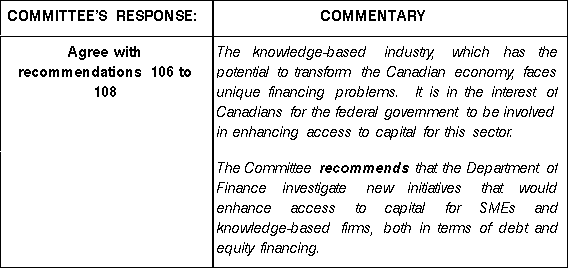
Financing Aboriginal Business
109. The Task Force endorses the recommendation of the National Aboriginal Financing Task Force that, subject to reasonable consensus within the aboriginal community, changes be made to federal legislation so that movable personal property situated on reserves may be used as security, thereby facilitating the provision of credit by financial institutions to aboriginal individuals and institutions.110. The Task Force urges financial institutions to continue to pursue initiatives which are supportive of the economic development initiatives of aboriginal peoples and, for that purpose, to establish and maintain tailored, innovative financing programs.
111. The data collection programs to be undertaken by Statistics Canada and Industry Canada should include detailed information gathering on aboriginal financing issues to fill the void in data identified by the National Aboriginal Financing Task Force.

Improving the Regulatory Framework
OSFI Mandate and Governance
112. There should be revisions to the OSFI statutory mandate to better describe its ongoing responsibilities with regard to the federally regulated financial services sector.
- (a) OSFI should have a clearly defined statutory responsibility to administer the
consumer protection provisions of federal financial institutions legislation,
including legislation in respect of disclosure and transparency, privacy and
coercive tied selling.
- (b) Given the importance of effective competition in the Canadian financial services
sector and the rapidly changing competitive environment, the OSFI mandate
should be revised to make it clear that OSFI has the responsibility to balance
competition and innovation considerations with its present statutory obligations
in respect of safety and soundness.
- (c) It should be made clear in the OSFI mandate that OSFI is required to protect the
rights and interests of depositors and policy holders, but that it has no special
responsibility to other creditors of financial institutions.
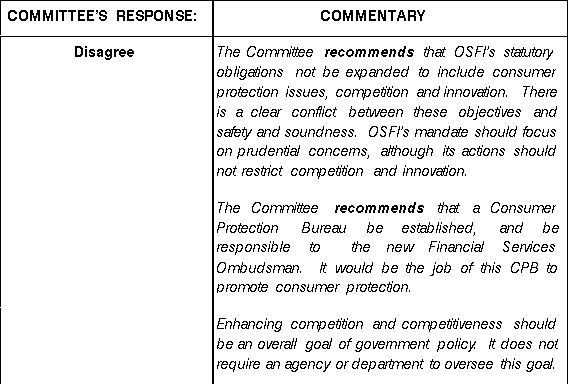
113. The governance structure of OSFI should be strengthened to make it more appropriate to the increasingly complex needs of regulation and its revised mandate. To that end:
- (a) The OSFI Act should be amended to provide for a board of directors for OSFI,
made up of a majority of independent directors, including experienced
independent businesspeople and persons familiar with consumer issues,
together with the Superintendent of OSFI, the Chair of CDIC, the Governor of the
Bank of Canada and the Deputy Minister of Finance. An independent director
should serve as board chair.
- (b) The board of directors would be responsible for:
- (i) overseeing how OSFI conducts its business and administrative affairs;
- (ii) approving major OSFI policies and strategies;
- (iii) monitoring the achievement by OSFI of progress against its strategic plans
and statutory mandate; and
- (iv) ensuring that there is effective senior management, particularly in the
position of the Superintendent, who should be appointed by the Minister of
Finance on the recommendation of the OSFI board.

Regulatory Overlap
114. To eliminate regulatory overlap at the federal level, OSFI should have the sole responsibility for promoting standards of sound business and financial practices in financial institutions and for establishing policies and procedures to manage and control risk. To that end, the present overlapping statutory mandate of CDIC on these subjects should be repealed. OSFI should collaborate closely with CDIC in establishing business standards, financial practices and risk management policies, and should act on behalf of CDIC in monitoring compliance.

115. Governments should work aggressively to eliminate overlap in prudential
regulation, both between the federal and provincial governments and among provincial
governments. To that end:
- (a) In consultation with provincial regulators, OSFI should establish a central,
electronic data base which would permit common reporting formats and
single-window electronic filings.
- (b) The provinces should be encouraged to delegate solvency regulation of trust,
loan and life insurance companies to OSFI so that, over time, prudential
regulatory responsibilities for financial institutions could be consolidated in a
single, well-resourced, and experienced regulator, applying common practices
and international standards.
- (c) To the extent that delegation cannot be achieved, the federal government and the
provinces should harmonize the laws and regulations relating to trust, loan and
insurance companies, including in particular the development of common capital
adequacy tests and the recognition of home-jurisdiction regulation.
- (a) Approvals of regulatory action should be taken at appropriate levels within
government. Wherever practicable, the Superintendent of OSFI should be
mandated to provide approvals without the need for referral to the Minister of
Finance, except where matters of policy are involved.
- (b) Decisions on the entry into Canada of foreign banks should, in routine cases, be
made by the Superintendent of OSFI rather than the Governor-in-Council. Only in
cases involving significant policy issues should the approval of the Minister of
Finance be required.
- (c) Wherever possible, approvals should be replaced with notice filings or eliminated
entirely for non-material matters and in other circumstances in which there is little
or no prudential risk.
- (d) Mechanisms such as blanket or consolidated approvals and fast-track approvals
or advance rulings should be developed to streamline the regulatory process.
- To implement this proposal, a committee should be struck with representation
from OSFI, the Department of Finance and the affected financial services
industries to review streamlining options, with priority to be given to easing
requirements which entail the greatest regulatory burden.

Consumer Insurance Plans
117. In order to promote effective competition between banks and insurers, to eliminate public confusion and to provide equivalent protection to Canadians, regardless of their choice of financial services provider, the insurance plans for federally insured deposit-taking institutions and life insurers should be amalgamated. The Task Force proposes that one of two possible models be adopted:
- (a) The continuation of the Canada Deposit Insurance Corporation (CDIC) as a
Crown corporation, with access to the Consolidated Revenue Fund, but with an
expanded scope to cover the activities now conducted by the Canadian Life and
Health Insurance Compensation Corporation (CompCorp).
- (b) A new independent organization, established by statute and with provision for a
liquidity backup borrowing authority from the Consolidated Revenue Fund, but
without Crown corporation status.
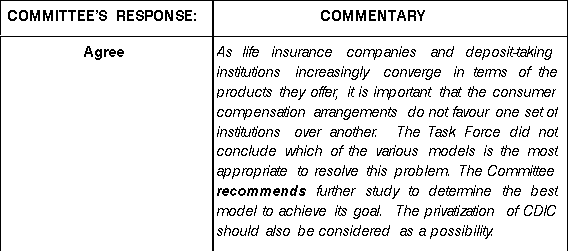
118. The amalgamated insurance plan would, in the first instance, maintain separate pre-funded insurance pools for deposit-taking institutions and for life insurers. It would also have the mandate to review and, where possible, to develop a common framework for priorities in insolvency, product coverage and other matters where there are now different legal rules or differing CDIC and CompCorp policies.

Provision of financial Services from Outside Canada
119. The Bank Act should be amended to make it clear that all providers of financial services that undertake mass solicitations or target marketing of financial services to Canadians without establishing a physical presence in Canada are required to comply with federal financial institutions legislation. For a lender, such compliance would entail the need to obtain certification from OSFI, which would be available upon the lender's filing a binding undertaking to comply with consumer protection rules applicable to banks in Canada, to disclose that it is not regulated in Canada, and to provide a mechanism for dispute resolution in Canada.120. The certification process would not be available to financial services companies wishing to take deposits from, or sell insurance products to, Canadians from outside Canada. Such providers would continue to be required to conduct these activities through a regulated Canadian subsidiary or branch.
121.The Task Force affirms its belief that an important element of consumer protection in an age of electronic service providers will be the provision of timely and accurate information, designed to inform consumers accurately about the status of providers. To that end, OSFI should regularly publish on its Web site, and periodically make visible to Canadians through other appropriate media and means, accurate information whereby consumers will be able to know:
- (a) the companies that are regulated by OSFI or other Canadian regulators;
- (b) the companies that do not have a physical operation in Canada but have
obtained OSFI certification of their lending activities to Canadians; and
- (c) the companies which OSFI believes to be offering financial services to Canadians
illegally.
123. OSFI should actively participate in international discussions designed to develop an appropriate regulatory regime applicable to trans-border Internet providers of financial services so that Canadian law and regulatory practice, in a timely manner, incorporate international best practices to protect Canadian consumers.
124. Canada should continue to play an active role in international initiatives to improve standards and processes for the regulation of financial institutions and, where required, should make timely changes to Canadian financial sector legislation and regulatory practices to implement international best practices.
